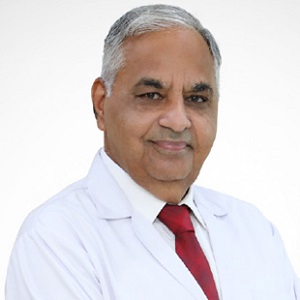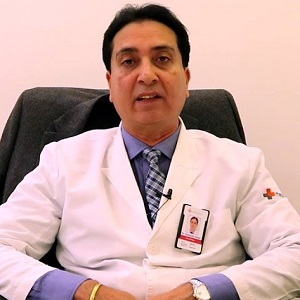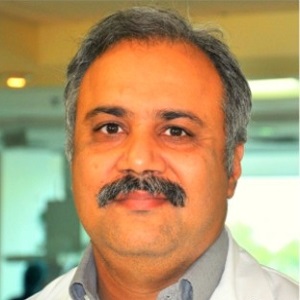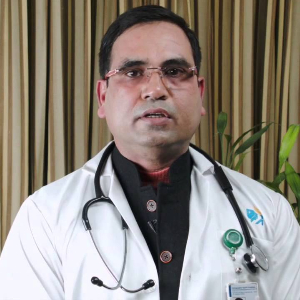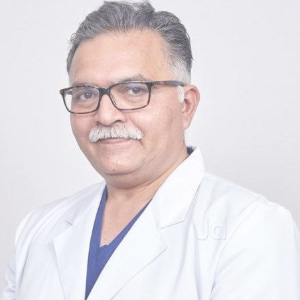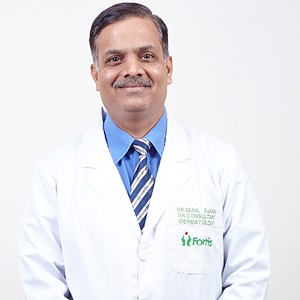Best Doctors in India for Alcoholic Hepatitis Treatment
- Bariatric & Laparoscopic Surgeon, New Delhi, India
- Over 35 years’ experience
Profile Highlights:
- In 1994 after returning from the UK, Dr. Anil Sharma worked at Sir Ganga Ram Hospital, New Delhi.
- He was associated with the founding of the Department of Minimal Access Surgery since its inception in 1996.
- Dr. Anil Sharma has a special interest in the surgical management of abdominal wall hernias, a subject on which he has conducted numerous operative workshops, throughout his career.
- He has also lectured extensively worldwide and contributed several chapters in International publications.
- Endocrinologist & Diabetologist, New Delhi, India
- Over 33 years’ experience
Profile Highlights:
- Dr. Ashok Kumar Jhingan has been treating chronic diabetes patients and has an experience of 33 years in this arena.
- He completed MBBS from Maulana Azad Medical College in 1974, FICA from All India Institute of Medical Sciences, New Delhi in 1975, and MD – General Medicine from All India Institute of Medical Sciences, New Delhi in 1997.
- Dr. Jhingan is known for rendering health education for the prevention and treatment of Diabetes Education
- Dermatologist, Gurugram, India
- Over 20 years’ experience
Profile Highlights:
- Dr. Ramajeet Singh has been one of India’s top dermatologists, who has earned over 20 years of experience.
- He is pioneering the concept of Laser in cosmetology.
- He is an expert in innovative aesthetic makeovers.
- Pediatric Gastroenterologist, New Delhi, India
- Over 26 years’ experience
Profile Highlights:
- Dr. Anupam Sibal is one of the best Pediatric Gastroenterologists in Delhi, having nearly 26 years of experience in treating GI and liver disorders.
- He is a senior consultant for Pediatric Gastroenterology and Hepatology at Indraprastha Apollo Hospital, Delhi. Additionally, he is working as Group Medical Director of Apollo Hospitals.
- He has expertise in Congenital Disorders Evaluation & Treatment, Growth & Development Management, injuries in children, and complete Paediatric health checkups.
- Dr. Sibal went for International certifications and training to improvise.
- Dr. Sibal won many National and International Awards for his excellent work.
- Besides authoring 99 medical writing Dr. Sibal has written a bestselling book, “Is Your Child Ready to Face the World?” and edited/proofread a textbook on Gastroenterology & Hepatology.
- Endocrinologist, Gurugram, India
- Over 20 years’ experience
Profile Highlights:
- Dr. Dheeraj Kapoor is a well-known Endocrinologist in New Delhi who has expertise in treating diabetes-related complications.
- After completing his MBBS & Masters in Medicine, he did his DM Endocrinology from the Institute of Medical Sciences, Banaras Hindu University, Varanasi
- Dr. Dheeraj Kapoor is an active member of various renowned organizations such as the Association of Physicians of India, the Endocrine Society of India, and Research Society for the Study of Diabetes in India, and the Indian Thyroid Society.
- Medical Oncologist, New Delhi, India
- Over 20 years’ experience
Profile Highlights:
- Dr. P K Das is one of the best Oncologists in India with an extensive career as the Senior Consultant Medical Oncologist, the Hemato- Oncologist, and Academic Coordinator of Dept of medical oncology at the Apollo Cancer Institute in New Delhi.
- With many years of experience at the Apollo Hospital, Dr. P K Das has been diligently treating patients and proactively contributing to the medical sector by working alongside topmost doctors in medical oncology.
- Orthopedic Surgeon, Gurugram, India
- Over 26 years’ experience
Profile Highlights:
- Dr. Raman Kant Aggarwal is a leading Orthopedic Surgeon with expertise in the management and treatment of shoulders and sports injuries.
- He has been performing orthopedic surgeries for the shoulder and sports injuries for more than 26 years and has experience in performing all kinds of replacement and reconstruction surgeries of the shoulders and upper limbs.
- He holds the credit for performing the highest number of total shoulder replacement surgery and shoulder arthroscopy in Delhi and NCR.
- Endocrinologist & Diabetologist, Gurugram, India
- Over 26 years’ experience
Profile Highlights:
- Dr. Manish Gutch is a well-trained Endocrinologist with specializations in Diabetes & Metabolism, Osteoporosis, Menopause, and Hormonal Disorders.
- He is presently working at Medanta Hospital as the director of the Endocrinology department.
- Dr. Manish Gutch’s high intellectual capacity is reflected through his outstanding achievement of three Gold medals during the successful completion of MBBS, MD, and DM.
- Dermatologist & Cosmetologist, Gurugram, India
- Over 20 years’ experience
Profile Highlights:
- Dr. Sunil Sanghi is a professional dermatologist with an experience of more than two decades in this field.
- He served the Indian Army as a Dermatologist from where he earned the prestigious Gold Medal.
- He is on the editorial board of the Indian Journal of Dermatologists, Venereologists & Leprologists and a reviewer of many index journals.
- Dermatologist, New Delhi, India
- Over 20 years’ experience
Profile Highlights:
- Dr. Ajita Bagai Kakkar is one of the most professional doctors in the arena of Dermatology.
- She specializes in Lasers and Aesthetic medicines.
- She has been practicing for over 20 years and many patients have immensely benefited from her knowledge and skill.
Best Hospitals in India for Alcoholic Hepatitis Treatment
ALCOHOLIC HEPATITIS
Alcoholic hepatitis is a liver infection, which is mainly caused by frequent, heavy use of alcohol. Fat can build up in the liver cells, which might lead to inflammation as well as scarring of the liver.
Alcoholic hepatitis might be mild or severe. A patient might even need a liver transplant if proper treatment is not provided, or if they don’t stop consumption of alcohol.
It is also notable that all heavy drinkers don’t develop this condition, and sometimes this condition even develops in people who drink moderately. However, if you are diagnosed with this condition, it is important for you to quit drinking alcohol. People who continue drinking alcohol might face a huge risk of serious liver damage as well as death.
Symptoms
Depending on the amount of damage to the liver, the symptoms can vary. If you are having a mild form of the disease, you might not even experience any symptoms at all. However, as the damage continues to grow, you might experience the following:
- Changes in appetite
- Dry mouth
- Weight loss
- Pain or swelling in the abdomen
- Jaundice, or yellowing of the skin or eyes
- Fever
- Nausea and vomiting
- Easy bleeding or bruising
- Changes in your mental state, including confusion
- Fatigue
The symptoms of this condition are similar to those caused by a few other health conditions. Therefore, if you develop any of these symptoms, it is best to get a proper diagnosis as well as begin treatment.
Causes & risk factors
Alcoholic hepatitis generally develops when the alcohol you drink causes damage to your liver. However, it is not clear why alcohol does this damages only to some heavy drinkers.
Few factors that are known to play a role in this condition include:
- The body’s process that breaks down alcohol produces some toxic chemicals
- These chemicals can trigger inflammation that can destroy the liver cells
- Thus, over time, scars replace healthy liver tissue, thus interfering with the function of the liver
- This irreversible scarring, which is also termed cirrhosis, is the final stage of alcoholic liver disease
If you have hepatitis C and continue to drink, even moderately, you are more likely to develop cirrhosis.
Some heavy drinkers are also malnourished because they don’t eat a proper balanced diet. Alcohol and its byproducts also prevent the body from absorbing nutrition properly. Lack of nutrition can contribute to liver cell damage.
Some other risk factors that can lead to this condition include:
- Your sex- Women are usually at a higher risk of developing alcoholic hepatitis since the way alcohol is processed in women is different.
- Binge drinking- Having over five drinks within two hours for men and four or more for women can increase the risk of alcoholic hepatitis.
- Obesity- Heavy drinkers who are overweight are also more likely to develop alcoholic hepatitis and to progress from that condition to cirrhosis.
- Race and ethnicity- Hispanic and Negroid people might be at higher risk of alcoholic hepatitis.
- Genetic factors- According to studies, there may be a genetic component in alcohol-induced liver disease. However, it is difficult to separate genetic and environmental factors.
Diagnosis
If you are showing symptoms of alcoholic hepatitis, your doctor will first inquire about your medical history and alcohol consumption. Next, he/she will perform a physical exam to see if you have an enlarged liver or spleen. They might also need a few more tests to confirm your diagnosis, such as:
- Complete blood count (CBC)
- Liver function test
- Ultrasound of the liver
- Abdominal CT scan
- Blood clotting tests
In some cases, a liver biopsy might also be needed to confirm the diagnosis of alcoholic hepatitis. A liver biopsy requires your doctor to remove a tissue sample from your liver, which is then tested in the lab. This method helps to show the severity and type of liver disease.
Treatment
Stopping alcohol consumption is the most important treatment for alcoholic hepatitis. There is no cure for this condition, but treatment can help in reducing or eliminating symptoms, or stopping its progression.
It is also important to note that scarring of the liver is permanent, but treatment can aim to restore as much function as possible.
Dietary changes
Medication
Liver transplant
The best hope of recovery is to be aware of the signs and symptoms as well as to reduce, manage, or if possible, completely stop consumption of alcohol.
Complications
Alcoholic hepatitis might lead to severe other complications such as:
- Enlarged veins (varices)- In this condition, blood that is unable to flow freely through the portal vein, can back up into other blood vessels in your esophagus or stomach.
- Hepatic encephalopathy- This condition can be caused by the buildup of toxins if your damaged liver is unable to remove all the toxins from your body. It involves confusion, drowsiness, and slurred speech.
- Ascites- Ascites is a condition in which the fluid that accumulates in the abdomen may get infected and thus, require treatment with antibiotics. Although this condition is not life-threatening, it can be a sign of advanced alcoholic hepatitis, or cirrhosis.
- Kidney failure- A damaged liver affects blood flow to the kidneys, thus resulting in kidney failure.
- Cirrhosis- The scarring of the liver might lead to liver failure.
Prevention
Alcoholic hepatitis might be prevented if you take the following steps:
- Drink alcohol in moderation, if at all- For healthy adults, moderate drinking means no more than one drink a day for women of all ages and men older than 65, and not over two drinks a day for men aged 65 and younger. However, if you prevent all alcohol, it is a certain way to prevent this condition.
- Check before mixing medications and alcohol- Ask your doctor if it’s safe to drink alcohol while you are taking medications. Consider reading the warning labels on over-the-counter medications as well. Don’t drink alcohol when you are taking medications that warn of complications when combined with alcohol.
- Protect yourself from hepatitis C- Hepatitis C is an infectious liver disease that is caused by a virus. If it is left untreated, it may lead to cirrhosis. If you are having hepatitis C and you consume alcohol, you’re generally more likely to develop cirrhosis than if you don’t drink.


